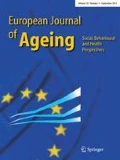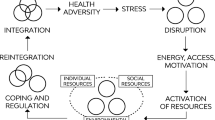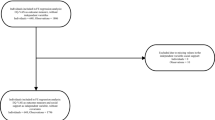Abstract
Multimorbidity—the co-occurrence of multiple illnesses—is a frequent condition in older adults and poses serious threats to autonomy. In order to identify resources for autonomy despite multimorbidity, our longitudinal study tested main and interaction effects of personal and social resources (self-efficacy and social support) on maintaining autonomy. Three hundred and nine individuals (aged 65–85 years) with multiple illnesses completed measures of self-efficacy beliefs, received instrumental social support and perceptions of autonomy. Data were analyzed using structural equation modeling. Cross-sectionally, individuals with lower perceptions of autonomy received more support from their networks. Longitudinally, the relation of received support with autonomy was moderated by self-efficacy: Simple slopes analyses showed that social support compensated for lower levels of self-efficacy, whereas in individuals with higher self-efficacy the resources interfered. Receiving social support bolstered autonomy in lower self-efficacious individuals, but in highly self-efficacious individuals support threatened autonomy. This has implications for both theory and practice, as it suggests differential effects of social resources depending on personal resources.



Similar content being viewed by others
References
Aiken LS, West SG (1991) Multiple regression: testing and interpreting interactions. Sage, Newbury Park
Aymanns P (1992) Krebserkrankung und familie [cancer and family]. Hans Huber, Bern
Baltes MM (1995) Dependency in old age: gains and losses. Curr Dir Psychol Sci 4:14–19
Baltes MM, Silverberg S (1994) The dynamics between dependency and autonomy: illustrations across the life span. In: Featherman DL, Lerner RM, Perlmutter M (eds) Life-span development and behavior. Erlbaum, Hillsdale, pp 41–90
Baltes MM, Wahl H-W (1992) The dependency-support script in institutions: generalization to community settings. Psychol Aging 7:409–418
Baltes MM, Kindermann T, Reisenzein R, Schmid U (1987) Further observational data on the behavioral and social world of institutions for the aged. Psychol Aging 2:390–403
Baltes MM, Neumann E-M, Zank S (1994) Maintenance and rehabilitation of independence in old age: an intervention program for staff. Psychol Aging 9:179–188
Bandura A (1997) Self-efficacy: the exercise of control. Freeman, New York
Barrera M (1986) Distinctions between social support concepts, measures, and models. Am J Community Psychol 14:413–445
Bengtson VL, Kuypers JA (1985) The family support cycle: psycho-social issues in the aging family. In: Munnichs JMA, Mussen P, Olbrich E (eds) Life span and change in a gerontological perspective. Academic Press, New York, pp 61–77
Bolger N, Zuckerman A, Kessler RC (2000) Invisible support and adjustment to stress. J Pers Soc Psychol 79:953–961
Bonetti D, Johnston M, Rodriguez-Marin J, Pastor M, Martin-Aragon M, Doherty E, Sheehan K (2001) Dimensions of perceived control: a factor analysis of three measures and an examination of their relation to activity level and mood in a student and cross-cultural patient sample. Psychol Health 16:655–674
Brehm JW, Cole AH (1966) Effect of a favor which reduces freedom. J Pers Soc Psychol 3:420–426
Brown SL, Vinokur AD (2003) The interplay among risk factors for suicidal ideation and suicide: The role of depression, poor health, and loved ones’ messages of support and criticism. Am J Community Psychol 32:131–141
Charlson ME, Szatrowski TP, Peterson J, Gold J (1994) Validation of a combined comorbidity index. J Clin Epidemiol 47:1245–1251
Chen G, Gully SM, Whiteman JA, Kilcullen RN (2000) Examination of relationships among trait-like individual differences, state-like individual differences, and learning performance. J Appl Psychol 85:835–847
Cohen JL, Lakey B, Tiell K, Neeley LC (2005) Recipient-provider agreement on enacted support, perceived support, and provider personality. Psychol Assess 17:375–378
Curran PJ, West SG, Finch JF (1996) The robustness of test statistics to nonnormality and specification error in confirmatory factor analysis. Psychol Meth 1:16–29
Edelbrock D, Buys LR, Waite LM, Grayson DA, Broe GA, Creasey H (2001) Characteristics of social support in a community-living sample of older people: the sydney older persons study. Australas J Ageing 20:173–178
Endler NS, Kocovski NL, Macrodimitris SD (2001) Coping, efficacy, and perceived control in acute versus chronic illnesses. Pers Indiv Differ 30:617–625
Fauth EB, Zarit SH, Malmberg B, Johansson B (2007) Physical, cognitive, and psychosocial variables from the disablement process model predict patterns of independence and the transition into disability for the oldest-old. Gerontologist 47:613–624
Fortin M, Lapointe L, Hudon C, Vanasse A, Ntetu AL, Maltais D (2004) Multimorbidity and quality of life in primary care: a systematic review. Health Qual Life Outcome 2:51. doi: 10.1186/1477-7525-1182-1151
Gijsen R, Hoeymans N, Schellevis FG, Ruwaard D, Satariano WA, van den Bos GA (2001) Causes and consequences of comorbidity: a review. J Clin Epidemiol 54:661–674
Greiner W, Weijnen T, Nieuwenhuizen M, Oppe S, Badia X, Busschbach J et al (2003) A single European currency for EQ-5D health states. Eur J Health Econ 4:222–231
Groll DL, To T, Bombardier C, Wright JG (2005) The development of a comorbidity index with physical function as the outcome. J Clin Epidemiol 58:595–602
Haber MG, Cohen JL, Lucas T, Baltes BB (2007) The relationship between self-reported received and perceived social support: a meta-analytic review. Am J Community Psychol 39:133–144
Hays J, Saunders W, Flint E, Kaplan B, Blazer D (1997) Social support and depression as risk factors for loss of physical function in late life. Aging Ment Health 1:209–220
Helgeson VS, Cohen S (1996) Social support and adjustment to cancer: reconciling descriptive, correlational, and intervention research. Health Psychol 15:135–148
Hertz JE, Anschutz CA (2002) Relationships among perceived enactment of autonomy, self-care, and holistic health in community-dwelling older adults. J Holist Nurs 20:166–186. doi:10.1177/08910102020002006
Klein A, Moosbrugger H (2000) Maximum likelihood estimation of latent interaction effects with the LMS method. Psychometrika 65:457–474
Lawton MP, Brody EM (1969) Assessment of older people: self-maintaining and instrumental activities of daily living. Gerontologist 9:179–186
Librero J, Peiró S, Ordiñana R (1999) Chronic comorbidity and outcomes of hospital care: length of stay, mortality, and readmission at 30 and 365 days. J Clin Epidemiol 52:171–179
Longino CF, Lipman A (1981) Married and spouseless men and women in planned retirement communities: Support network differentials. J Marriage Fam 43:169–177
Lu L, Argyle M (1992) Receiving and giving support: effects on relationships and well-being. Counsell Psychol Q 5:123
Luszczynska A, Gibbons FX, Piko B, Teközel M (2004) Self-regulatory cognitions, social comparison, perceived peers’ behaviors as predictors of nutrition and physical activity: a comparison among adolescents in hungary, poland, turkey, and USA. Psychol Health 19:577–593
Luszczynska A, Gutiérrez-Doña B, Schwarzer R (2005a) General self-efficacy in various domains of human functioning: evidence from five countries. Int J Psychol 40:80–89
Luszczynska A, Scholz U, Schwarzer R (2005b) The general self-efficacy scale: multicultural validation studies. J Psychol 139:439–457
Luszczynska A, Boehmer S, Knoll N, Schulz U, Schwarzer R (2007) Emotional support for men and women with cancer: do patients receive what their partners provide? Int J Behav Med 14:156–163
Matsui M, Capezuti E (2008) Perceived autonomy and self-care resources among senior center users. Geriatr Nurs 29:141–147
Meredith W (1993) Measurement invariance, factor analysis and factorial invariance. Psychometrika 58:525–543
Newsom JT, Schulz R (1998) Caregiving from the recipient’s perspective: Negative reactions to being helped. Health Psychol 17:172–181
Pavot WG, Diener E, Colvin CR, Sandvik E (1991) Further validation of the satisfaction with life scale: evidence for the cross-method convergence of well-being measures. J Pers Assess 57:149–161
Proot IM, Crebolder HFJM, Abu-Saad HH, Macor THGM, Meulen RHJT (2000) Facilitating and constraining factors on autonomy: the views of stroke patients on admission into nursing homes. Clin Nurs Res 9:460–478. doi:10.1177/10547730022158690
Proot IM, ter Meulen RHJ, Abu-Saad HH, Crebolder HFJM (2007) Supporting stroke patients’ autonomy during rehabilitation. Nurs Ethics 14:229–241. doi:10.1177/0969733007073705
Reich JW, Zautra AJ (1995) Spouse encouragement of self-reliance and other-reliance in rheumatoid arthritis couples. J Behav Med 18:249
Reis HT, Sheldon KM, Gable SL, Roscoe J, Ryan RM (2000) Daily well-being: the role of autonomy, competence, and relatedness. Pers Soc Psychol Bull 26:419–435
Revenson TA, Wollman CA, Felton BJ (1983) Social supports as stress buffers for adult cancer patients. Psychosom Med 45:321–331
Ringdal GI, Ringdal K, Jordhøy MS, Kaasa S (2007) Does social support from family and friends work as a buffer against reactions to stressful life events such as terminal cancer? Palliat Supportive Care 5:61–69
Ryan RM, Deci EL (2000) Self-determination theory and the facilitation of intrinsic motivation, social development, and well-being. Am Psychol 55:68–78
Ryan RM, Deci EL (2006) Self-regulation and the problem of human autonomy: Does psychology need choice, self-determination, and will? J Pers 74:1557–1585
Ryan RM, Solky JA (1996) What is supportive about social support? In: Pierce GR, Sarason BR, Sarason IG (eds) Handbook of social support and the family. Plenum Press, New York, US, pp 249–267
Ryff CD (1995) Psychological well-being in adult life. Curr Dir Psychol Sci 4:99–104
Sarason IG, Levine HM, Basham RB, Sarason BR (1983) Assessing social support: the social support questionnaire. J Pers Soc Psychol 44:127–139
Schröder K (1997) Self-regulation competence in coping with chronic disease. Internationale Hochschulschriften, Waxmann, Münster
Schröder K, Schwarzer R, Konertz W (1998) Coping as a mediator in recovery from cardiac surgery. Psychol Health 13:83–97
Schulenburg JM, Claes C, Greiner W, Uber A (1998) Die deutsche Version des EuroQol-Fragebogens [The German version of the EQ5D]. Z Gesundh Wiss 6:3–20
Schulz U, Schwarzer R (2003) Soziale Unterstützung bei der Krankheitsbewältigung: Die Berliner Social Support Skalen (BSSS). Diagnostica 49:73–82
Schüz B, Wurm S, Warner LM, Ziegelmann JP (in press) Self-efficacy and illness representations in individuals with multimorbidity: a multilevel approach. Psychol Health
Schwarzer R (1994) Optimism, vulnerability, and self-beliefs as health-related cognitions: a systematic overview. Psychol Health 9:161–180
Schwarzer R (2008) Perceived autonomy in old age. http://userpage.fu-berlin.de/~health/autonomy.htm. Accessed 19 June 2010
Schwarzer R, Jerusalem M (1995) Generalized self-efficacy scale. In: Weinman J, Wright S, Johnston M (eds) Measures in health psychology: a user’s portfolio. Causal and control beliefs. NFER-Nelson, Windsor, pp 35–37
Schwarzer R, Knoll N (2007) Functional roles of social support within the stress and coping process: a theoretical and empirical overview. Int J Psychol 42:243–252
Schwarzer R, Leppin A (1991) Social support and health: a theoretical and empirical overview. J Soc Pers Relat 8:99–127
Schwarzer R, Schulz U (2000) Berlin social support scales (BSSS). www.coping.de. Accessed 19 June 2010
Schwarzer R, Boehmer S, Luszczynska A, Mohamed NE, Knoll N (2005) Dispositional self-efficacy as a personal resource factor in coping after surgery. Pers Indiv Differ 39:807–818
Seeman TE, Bruce ML, McAvay GJ (1996) Social network characteristics and onset of ADL disability: Macarthur studies of successful aging. J Gerontol B Psychol Sci Soc Sci 51:191–200
Seeman TE, Unger JB, McAvay G, Mendes de Leon CF (1999) Self-efficacy beliefs and perceived declines in functional ability: Macarthur studies of successful aging. J Gerontol B Psychol Sci Soc Sci 54B:214–222
Sibley A, Kersten P, Ward CD, White B, Mehta R, George S (2006) Measuring autonomy in disabled people: validation of a new scale in a UK population. Clin Rehabil 20:793–803
Silverstein M, Xuan C, Heller K (1996) Too much of a good thing? Intergenerational social support and the psychological well-being of older parents. J Marriage Fam 58:970–982
Smith J, Goodnow JJ (1999) Unasked-for support and unsolicited advice: age and the quality of social experience. Psychol Aging 14:108–121
Steverink N, Lindenberg S, Slaets JPJ (2005) How to understand and improve older people’s self-management of wellbeing. Eur J Ageing 2:235–244
Tabachnick BG, Fidell LS (2007) Using multivariate statistics, 5th edn. Allyn & Bacon/Pearson Education, Boston
Thompson SC, Sobolew-Shubin A (1993) Perceptions of overprotection in ill adults. J Appl Soc Psychol 23:85–97
Väänänen A, Vahtera J, Pentti J, Kivimäki M (2005) Sources of social support as determinants of psychiatric morbidity after severe life events: prospective cohort study of female employees. J Psychosom Res 58:459–467
van den Akker M, Buntinx F, Metsemakers JF, Roos S, Knottnerus JA (1998) Multimorbidity in general practice: prevalence, incidence, and determinants of co-occurring chronic and recurrent diseases. J Clin Epidemiol 51:367–375
Von Bergen CW, Soper B, Rosenthal GT, Cox SJ, Fullerton R (1999) When helping hurts: negative effects of benevolent care. J Am Psychiatr Nurses Assoc 5:134–136
Wahl H-W (1991) Dependence in the elderly from an interactional point of view: verbal and observational data. Psychol Aging 6:238–246
Warner LM, Schüz B, Wurm S, Ziegelmann JP, Tesch-Römer C (2010) Giving and taking–differential effects of providing, receiving and anticipating emotional support on quality of life in adults with multiple illnesses. J Health Psychol 15:660–670
Wethington E, Kessler RC (1986) Perceived support, received support, and adjustment to stressful life events. J Health Soc Behav 27:78–89
Williams GC (2002) Improving patient’s health through supporting the autonomy of patients and providers. In: Deci EL, Ryan RM (eds) Handbook of self-determination research. University of Rochester Press, Rochester, pp 233–254
Williams GC, Freedman ZR, Deci EL (1998) Supporting autonomy to motivate patients with diabetes for glucose control. Diabetes Care 21:1644–1651
Wurm S, Tomasik MJ, Tesch-Römer C (2010) On the importance of a positive view on ageing for physical exercise among middle-aged and older adults: cross-sectional and longitudinal findings. Psychol Health 25:25–42
Zautra AJ, Reich JW, Newsom JT (1995) Autonomy and sense of control among older adults: an examination of their effects on mental health. In: Bond L, Cutler S, Grams A (eds) Promoting successful and productive aging. Sage, Newbury Park, pp 153–170
Zissi A, Barry MM, Cochrane R (1998) A mediational model of quality of life for individuals with severe mental health problems. Psychol Med 28:1221–1230
Acknowledgments
The German Ageing Survey was funded under Grant 301-1720-2/2 by the German Federal Ministry for Family, Senior Citizens, Women, and Youth. The present study, the first and the third author are funded by the German Federal Ministry of Education and Research (Grant No. 01ET0702); the second author is funded by Grant No. 01ET0801 by the same funding body. The content is the sole responsibility of the authors.
Author information
Authors and Affiliations
Corresponding author
Additional information
Communicated by Hans-Werner Wahl.
Rights and permissions
About this article
Cite this article
Warner, L.M., Ziegelmann, J.P., Schüz, B. et al. Maintaining autonomy despite multimorbidity: self-efficacy and the two faces of social support. Eur J Ageing 8, 3–12 (2011). https://doi.org/10.1007/s10433-011-0176-6
Published:
Issue Date:
DOI: https://doi.org/10.1007/s10433-011-0176-6




